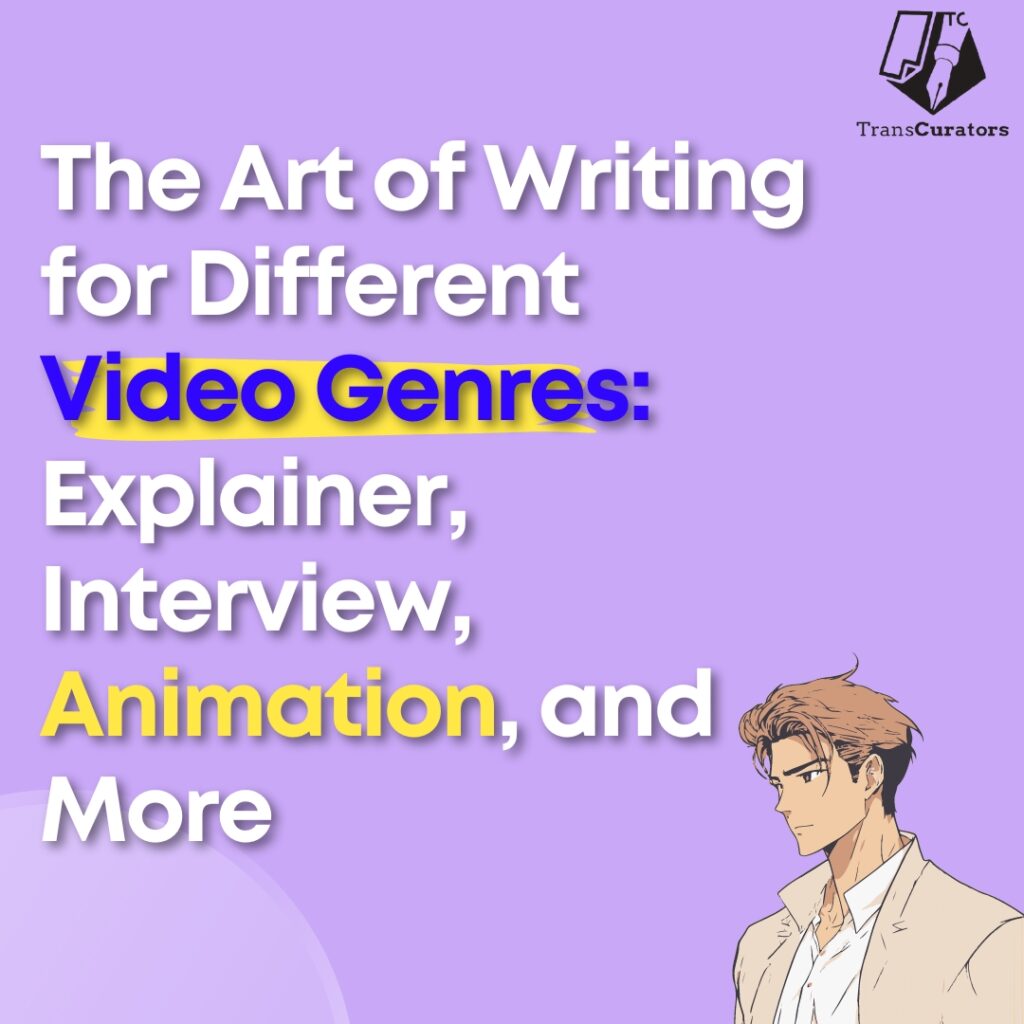Understanding The Basics Of Video Content Script Writing
A video content script, in simple terms, is a written roadmap that dictates what happens in a video, what the characters say and how they say it. As a YouTube content writer, creating a compelling script is paramount to your video’s success, irrespective of the genre. The script is the backbone of your video and provides structure and direction, ensuring your content is cohesive, engaging, and delivers the intended message effectively.
Writing for Explainer Videos
Explainer videos are a powerful tool for sharing complex ideas in a digestible and engaging way. The purpose of these videos is to break down complicated topics into simpler concepts that your audience can easily understand. Therefore, content writing for a YouTube explainer video should be straightforward, informative, and engaging.
To write an effective script for an explainer video, start with a clear definition of the problem that your video is addressing. Next, present your solution, explaining how it resolves the issue. Make sure your explanation is detailed but straightforward. Remember, the aim is to ‘explain,’ not to confuse further. Lastly, end with a strong call to action to keep your viewers engaged.
For example, consider the channel Kurzgesagt – In a Nutshell, a shining example of a YouTube channel that excels in explainer video scripts. Their complex subjects, combined with clear, concise script writing, leave viewers educated and entertained.
Writing for Interview Videos
Interview videos provide an interactive format that promotes insightful conversations and in-depth exploration of various subjects. As a YouTube video script writer, your goal should be to prepare thoughtful questions that provoke meaningful responses.
Begin by researching your interviewee to understand their background, interests, and expertise. Then, formulate open-ended questions that stimulate dialogue. Avoid yes/no questions as they limit the scope of the conversation. While it’s important to have a prepared script, be ready to go off-script if the conversation leads to an interesting avenue worth exploring.
Take inspiration from channels like Hot Ones, known for their engaging and unique interview scripts, leading to insightful and often hilarious conversations.
Writing for Animation Videos
Animation videos offer a creative and visually appealing way to convey a story or information. A good animation video script brings characters to life, makes the narrative compelling, and keeps the audience entertained throughout. But remember, while visuals are essential in animation, a well-written script is the foundation of a successful animated video.
Start by developing your characters and the world they live in. Next, define the conflict and the storyline. Use descriptive language to provide cues for the animator. Pay close attention to pacing, as animations often need to be faster to keep the audience engaged.
A prime example of exceptional animation video scripts is Pixar’s YouTube channel. Their content successfully blends storytelling, character development, and humor to engage their audience.
Exploring Other Video Genres
There’s a myriad of other video genres – tutorials, reviews, vlogs, and more. As a YouTube content writer, being able to adapt your writing to cater to these genres is a valuable skill. The key is understanding your audience and the purpose of the video. For instance, a tutorial video should be instructional and step-by-step, whereas a review video should be opinion-based and critical.
Brand Video Script: Creating Content for Commercial Use
When it comes to brand video script writing, the stakes are higher. These scripts not only need to be engaging but also communicate the brand message and provoke a specific action, such as making a purchase or subscribing to a service.
When crafting a brand video script, start with defining your target audience and the key message you want to deliver. Ensure your script reflects your brand’s tone and voice. Conclude with a compelling call-to-action to direct your audience towards the desired action.
A notable example of a successful brand video script is Nike’s YouTube content. Their scripts consistently embody their brand ethos of empowerment and determination.
Best Practices In Script Writing For YouTube Videos
Whether you’re a seasoned YouTube content writer or just starting, adhering to certain best practices can significantly enhance your scripts.
- Understand your audience: Knowing who you’re writing for helps tailor your content to their preferences, increasing engagement.
- Be concise: People have short attention spans. Keep your scripts brief, clear, and to the point.
- Tell a story: Stories resonate with people. Use narrative elements to create an engaging script.
- Use a conversational tone: Scripts should sound natural when spoken. Use conversational language to make your content relatable.
A channel that excels in these practices is TED-Ed. As one of the best YouTube channels for writers looking to learn and improve their script writing, their content is clear, engaging, and educational.
Conclusion
Mastering the art of writing for different video genres can significantly enhance the effectiveness of your YouTube content. Each genre requires a unique approach, but at the core, all compelling scripts are clear, engaging, and tailored to the intended audience. So whether you’re a seasoned YouTube content writer or just embarking on your content creation journey, explore these different genres, experiment with your writing, and watch your YouTube content flourish.
FAQs
1. What factors should I consider when script writing for Youtube videos?
Consider the purpose, tone, and target audience of each genre. Use clear language and visuals for explainer videos, engage viewers through questions and research for interviews, and employ vivid descriptions and narrative structure for animation scripts.
2. How does writing for different video genres affect storytelling techniques?
Writing for different video genres requires adapting storytelling techniques. Explainer videos use a problem-solution approach, interviews focus on character-driven narratives, and animations allow for imaginative storytelling with visual metaphors and world-building.
3. What challenges arise when writing for different video genres, and how can they be overcome?
Challenges include maintaining brevity while conveying information, ensuring coherence in interviews or animations, and staying current with trends. Simplify complex ideas, use storyboards or outlines, coordinate with collaborators, and stay updated to overcome these challenges.
